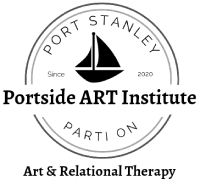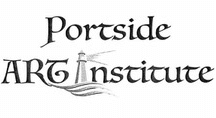Graduate Advanced Counselling Art Psychotherapy Diploma (C. Art Psych)
Our Program
The Portside Art and Relational Therapy Institute (PARTI) offers a comprehensive training program in the theory and practice of Art Therapy. Training takes place in Tuesday evening interactive learning groups, September – April, and in two residential weekends per year, and in five Monday workshops. Each year’s group moves through three years of intensive training together.
CURRICULUM OF TRAINING
- Ethics of Counselling Art Psychotherapy
- Counselling Art Psychotherapy Trainings and Techniques
- Counselling Art Psychotherapy Assessment
- Research Methods in Counselling Art Psychotherapy
- Family Art Psychotherapy
- Group Counselling Art Psychotherapy
- Case Studies in Counselling Art Psychotherapy
- Child Counselling Art Psychotherapy
- Adolescent Counselling Art Psychotherapy
- Equity and Diversity in Art Psychotherapy
- History and Theories of Art Psychotherapy
- Trauma-Informed Counselling Art Psychotherapy
- Human Development and Counselling Art Psychotherapy
- Abnormal Psychology and Counselling Art Psychotherapy
- Diversity and Inclusion in Art Psychotherapy
Components of Training
- Group process that emphasizes authenticity and empathy
- Theory readings, with connections made to students’ personal and professional experience
- Supervised practice counselling art psychotherapy in a supportive learning group
- Supervised work with clients starting in year two
- Case presentations in a supportive learning group starting in year three
All aspects of training aim to help students develop their own best personal integration of self, theory, and practice.
ADVANTAGES OF TRAINING AT PARTI
- Academically sound. PARTI’s synthesis of Art Psychotherapy theories provides a solid foundation for general practice and further specialization.
- Attention to Diversity. Training is embedded in an awareness of social power and diversity and how social context constructs self-experience.
- Practical. From year one, theory, experience, and practice are integrated in training sessions; by year three, a student is developing a supervised private practice.
- Intensive. Training is experiential in small groups.
- Manageable part-time. All course work, supervision, and client work can be scheduled for evenings and weekends.
- Personally rewarding. As members of a community committed to diversity and to respectful mutual interaction, students enjoy enhanced personal and professional self-esteem and the beginnings of long-lasting bonds of friendship and collegiality.
WHAT IS ART PSYCHOTHERAPY?
Art Psychotherapy is a powerful, effective model for working with individuals, couples, families, and youth who suffer from chronic emotional, psychological, and/or relational distress. Art Psychotherapy is based on the following principles:
- Emotional well-being depends on having satisfying mutual relationships with others.
- Emotional distress is often rooted in patterns of relational experience, past and present, which have the power to demean and deaden the self.
- The art therapist tries to understand the client’s unique self-experience in its social/relational context and to respond with empathy and genuine presence.
- Together, client and art therapist create a new in-depth relationship which is supportive, strengthening, and enlivening for the client.
- Within this secure relationship, the client can safely re-experience, and then find freedom from, the powerful effects of destructive relationships, past and present.
Art Psychotherapy helps clients understand their own patterns of thoughts and feelings about themselves, and the power of significant relationships, past and present, to shape this self-experience. Through the interpersonal process of therapeutic interaction, art therapy strengthens and transforms a client’s sense of self, which in turn enhances confidence and well-being. Empowerment and growth through interpersonal connection are both the process and the goal of art therapy.
With this perspective, art therapists take seriously the interpersonal impact of power differentials and social issues such as race, class, culture, gender, and sexual difference, and work with these issues as they are present in the client’s life and in the therapeutic relationship.
The principles of art psychotherapy taught by the Portside ART Institute are drawn from self-psychology, intersubjectivity theory, relational psychoanalysis, interpersonal neurobiology, psychodynamic developmental theory, trauma theory, feminist theories, and Fourth Wave modalities.
Our Program
The Portside Art and Relational Therapy Institute (PARTI) offers a comprehensive training program in the theory and practice of Art Therapy. Training takes place in Tuesday evening interactive learning groups, September – April, and in two residential weekends per year, and in five Monday workshops. Each year’s group moves through three years of intensive training together.
CURRICULUM OF TRAINING
- Ethics of Counselling Art Psychotherapy
- Counselling Art Psychotherapy Trainings and Techniques
- Counselling Art Psychotherapy Assessment
- Research Methods in Counselling Art Psychotherapy
- Family Art Psychotherapy
- Group Counselling Art Psychotherapy
- Case Studies in Counselling Art Psychotherapy
- Child Counselling Art Psychotherapy
- Adolescent Counselling Art Psychotherapy
- Equity and Diversity in Art Psychotherapy
- History and Theories of Art Psychotherapy
- Trauma-Informed Counselling Art Psychotherapy
- Human Development and Counselling Art Psychotherapy
- Abnormal Psychology and Counselling Art Psychotherapy
- Diversity and Inclusion in Art Psychotherapy
Components of Training
- Group process that emphasizes authenticity and empathy
- Theory readings, with connections made to students’ personal and professional experience
- Supervised practice counselling art psychotherapy in a supportive learning group
- Supervised work with clients starting in year two
- Case presentations in a supportive learning group starting in year three
All aspects of training aim to help students develop their own best personal integration of self, theory, and practice.
ADVANTAGES OF TRAINING AT PARTI
- Academically sound. PARTI’s synthesis of Art Psychotherapy theories provides a solid foundation for general practice and further specialization.
- Attention to Diversity. Training is embedded in an awareness of social power and diversity and how social context constructs self-experience.
- Practical. From year one, theory, experience, and practice are integrated in training sessions; by year three, a student is developing a supervised private practice.
- Intensive. Training is experiential in small groups.
- Manageable part-time. All course work, supervision, and client work can be scheduled for evenings and weekends.
- Personally rewarding. As members of a community committed to diversity and to respectful mutual interaction, students enjoy enhanced personal and professional self-esteem and the beginnings of long-lasting bonds of friendship and collegiality.
WHAT IS ART PSYCHOTHERAPY?
Art Psychotherapy is a powerful, effective model for working with individuals, couples, families, and youth who suffer from chronic emotional, psychological, and/or relational distress. Art Psychotherapy is based on the following principles:
- Emotional well-being depends on having satisfying mutual relationships with others.
- Emotional distress is often rooted in patterns of relational experience, past and present, which have the power to demean and deaden the self.
- The art therapist tries to understand the client’s unique self-experience in its social/relational context and to respond with empathy and genuine presence.
- Together, client and art therapist create a new in-depth relationship which is supportive, strengthening, and enlivening for the client.
- Within this secure relationship, the client can safely re-experience, and then find freedom from, the powerful effects of destructive relationships, past and present.
Art Psychotherapy helps clients understand their own patterns of thoughts and feelings about themselves, and the power of significant relationships, past and present, to shape this self-experience. Through the interpersonal process of therapeutic interaction, art therapy strengthens and transforms a client’s sense of self, which in turn enhances confidence and well-being. Empowerment and growth through interpersonal connection are both the process and the goal of art therapy.
With this perspective, art therapists take seriously the interpersonal impact of power differentials and social issues such as race, class, culture, gender, and sexual difference, and work with these issues as they are present in the client’s life and in the therapeutic relationship.
The principles of art psychotherapy taught by the Portside ART Institute are drawn from self-psychology, intersubjectivity theory, relational psychoanalysis, interpersonal neurobiology, psychodynamic developmental theory, trauma theory, feminist theories, and Fourth Wave modalities.
Curriculum
Becoming an art psychotherapist is a demanding process involving many kinds and levels of learning. The PARTI program is designed to offer the necessary learning components. Our ultimate goal is the integration of these components in each student’s professional sense of self.
The core group: Through the experience of group process, students learn about relational dynamics, empathic attunement, and the challenge of being with another deeply without losing oneself.
Theory: In each phase, theory seminars are presented on topics fundamental to art psychotherapy. Students participate in presentations and write integrative papers.
Practice counselling: Practice art psychotherapy sessions with peers are introduced in Phase 1, and continue through Phases 2 and 3. Immediate feedback is provided.
Supervised work with clients: Direct client work begins early in Phase 2 with regular supervision.
Personal coaching: Students engage in their own art psychotherapy weekly during training.
Additional Workshops: 5 additional workshops covering Social Justice, Respectful Relationship with Clients, Anti-oppression / Anti-Racism, Jurisprudence & Ethics, and the Business of Private Practice.
PHASE 1
Time: 3 hours weekly, September to April, readings and papers.
Primary focus: Introduction to Art Therapy through group experience, theory, and practice.
Content: Relational psychodynamic theory, self-psychology, intersubjectivity, attachment theory, feminist therapy.
Requirements:
- Attendance at weekly classes (no more than three absences)
- Mandatory workshops: Anti-oppression, Jurisprudence & Ethics, Private Practice
- Weekly reading assignments
- Integrative papers/presentations
Evaluation: Students evaluated by peers and faculty, plus self-evaluation. Readiness for Phase 2 assessed on:
- Capacity to be in relationship
- A sense of self cohesion
- Ability to engage in group process
- Comprehension of theory
- Self-reflective capacity
PHASE 2
Time: 3 hours weekly, September to April, with client work and supervision.
Primary focus: Integration of theory and practice; continued group process learning.
Content: Empathic attunement, therapeutic alliance, transference, intersubjective field.
Requirements:
- Attendance at weekly classes
- Mandatory Safe and Effective Use of Self Workshop
- Weekly readings and seminar prep
- Integrative papers
- 30+ hours of direct client work before Phase 3
Evaluation: Students assessed on:
- A growing capacity to be in relationship
- Comprehension of theory
- Supervision of 30 hours direct client work
- Deepening self-awareness and empathy
- Understanding of intersubjective dynamics
PHASE 3
Time: 3 hours weekly, September to April, plus client work and supervision.
Primary focus: Professional self-development, integration of theory and practice.
Content: Self-psychology, intersubjectivity, relational/attachment theory, fourth wave modalities.
Requirements:
- Attendance at weekly classes
- Reading assignments and presentations
- Integrative papers
- Maintaining 2+ clients with bi-weekly supervision
- Regular case presentations
Evaluation: Based on:
- Capacity to integrate theory and practice
- Ability to sustain a therapeutic alliance
- Sound knowledge and clinical ability in art psychotherapy
APPLICATION PROCEDURE
- Complete Application Form
- Write 2-3 page essay on readiness
- Include resume, proof of education
- Email or mail application by December 31st for the January-August semester
- Pay $150 fee by December 31st
- Submit 2 Recommendation Forms
ADMISSION REQUIREMENTS
Applicants should have experience in social work, counselling, therapy, or related fields. Applicants with 2+ years post-secondary but no degree must provide additional documents to establish equivalent competence. A Bachelor’s degree or equivalent learning is required.
FEES
- Phase 1: $6,600 tuition
- Phase 2: $6,600 tuition
- Phase 3: $6,600 tuition
Fees may be paid in instalments. Supervision costs are extra.
ADDITIONAL EXPENSES
Books, memberships, professional liability insurance, and supervision costs not included.
PROGRAM REQUIREMENTS
- 372 hours of coursework and workshops
- 100 hours of supervision
- 350 client hours
Students are encouraged to work with a relational counsellor before Phase 2.
Students
Students come from diverse professional and cultural backgrounds, many with experience in education, social work, nursing, or other helping professions. They bring self-awareness, a willingness to engage, and a commitment to experiential and relational learning.

